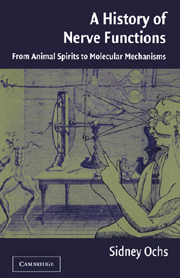Book contents
- Frontmatter
- Contents
- Preface
- 1 Introduction: Greek Science and the Recognition of Nerve as a Channel
- 2 Galen's Physiology of the Nervous System
- 3 Nerve, Brain, and Soul in the Middle Ages
- 4 Renaissance and the New Physiology
- 5 New Physical and Chemical Models of Nerve in the Enlightenment
- 6 New Systematizations of Nerve Function in the Enlightenment
- 7 Electricity as the Agent of Nerve Action
- 8 Nerve Fiber Form and Transformation
- 9 Wallerian Degeneration: Early and Late Phases
- 10 Nerve Regeneration
- 11 Characterization of Axoplasmic Transport
- 12 Molecular Models of Transport
- 13 Actions of Neurotoxins and Neuropathic Changes Related to Transport
- 14 Purposeful Reflexes and Instinctive Behavior
- 15 Neural Events Related to Learning and Memory
- 16 Epilogue: With Observations on the Relation of the Nervous System to Mind
- Bibliography
- Index
1 - Introduction: Greek Science and the Recognition of Nerve as a Channel
Published online by Cambridge University Press: 13 August 2009
- Frontmatter
- Contents
- Preface
- 1 Introduction: Greek Science and the Recognition of Nerve as a Channel
- 2 Galen's Physiology of the Nervous System
- 3 Nerve, Brain, and Soul in the Middle Ages
- 4 Renaissance and the New Physiology
- 5 New Physical and Chemical Models of Nerve in the Enlightenment
- 6 New Systematizations of Nerve Function in the Enlightenment
- 7 Electricity as the Agent of Nerve Action
- 8 Nerve Fiber Form and Transformation
- 9 Wallerian Degeneration: Early and Late Phases
- 10 Nerve Regeneration
- 11 Characterization of Axoplasmic Transport
- 12 Molecular Models of Transport
- 13 Actions of Neurotoxins and Neuropathic Changes Related to Transport
- 14 Purposeful Reflexes and Instinctive Behavior
- 15 Neural Events Related to Learning and Memory
- 16 Epilogue: With Observations on the Relation of the Nervous System to Mind
- Bibliography
- Index
Summary
Before the dawn of civilization, primitive man believed, as does primitive man today, in animism, magic, and supernatural forces to account for events in the world he experienced. The powers of nature are seen when, after the death of vegetation in winter, its rebirth occurs in spring. Storms with their lightning and thunder, wild animals, and the unpredictable and often turbulent behavior of man in relation to man were powers anthropomorphized through the action of spirits who were either beneficent or malevolent. The emotions felt within himself, man projected to other men, to other living beings, and even to inanimate objects moved by unseen forces.
With the rise of Greek philosophy and science, another view of nature and man arose: the belief that the cosmos and man are ruled by impersonal laws, that the gods do not take a providential interest in the affairs of man. As scientific knowledge evolved and the structures and functions of the various body organs became recognized, the nerves were singled out as having an integral relation to sensation and body movements. In some of the earliest accounts of nerve, they were thought of as channels carrying a spiritual influence to the brain in which consciousness and willed motor control over the body was located.
THE EARLY CONCEPTION OF NERVE CONFOUNDED WITH TENDONS
The artifacts and cave drawings left by prehistoric man attest to his powers of observation.
- Type
- Chapter
- Information
- A History of Nerve FunctionsFrom Animal Spirits to Molecular Mechanisms, pp. 1 - 23Publisher: Cambridge University PressPrint publication year: 2004



